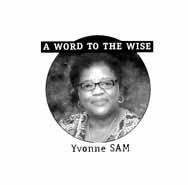
The longstanding problem of racial uneasiness between law enforcement and Blacks in Montreal has once again raised its ugly head by the continued racial profiling at the hands of the representatives of the SPVM.
What then is the underlying source of this ongoing problem? Why are Blacks stopped more often than any other racial group? What have the Montreal Police yet to learn or unlearn?
Is the Black community any nearer to finding a solution that would bring some form of inner peace to Blacks, especially when they encounter an arm of the law, are in environments that are not compatible with their social status, or drive vehicles that they are visually deemed incapable of owning.
A familiar French expression, which when translated says: “The more things change, the more they remain the same.”
Given the present state of affairs between Blacks and the Montreal police, the Black community in Montreal cannot afford to continue to live in this saying.
The root of the problem and the unwavering tragedy lies in our aversion to conversations of institutional and structural racism – our systems and structures – which have historically been proven to be racialized, wrong, and broken, and our refusal to look at it, understand it and then take action to change it. That is the PROBLEM, plain and simply stated. Instead, we prefer to believe in our rose-colored glass fiction of a post-racial reality, when everything social indicators, statistics, disparities… everything confirms the opposite. Our collective progress depends on facing and dealing with this reality.
The country and the province are currently convulsing over issues of diversity and race. Police departments from Montréal to Toronto and beyond have looked upon diversity hiring as the antidote to anti-Black police brutality and profiling.
Given the diversity of our communities, an issue of importance and concern to all is the policing of them. The harbored idea that the present disquiet within the Montreal police could be contributing to racial profiling clearly fails the litmus test of reality, in addition to showing elements of asininity. Quebec’s Public Security Minister, Martin Coiteux has launched an inquiry into what he himself has termed systemic problems within the Montreal police service.
What is happening in the Montreal police service is an outgrowth: a symptom of a larger problem, part and parcel of our Canadian tragedy, one of willful denial of the fact that despite all the progress made, it has not much strayed – culturally – from the roles it designates for Blacks in its national narrative, and the way it treats African Canadians.
A recent case involves former Canadian Olympic boxer Custio Clayton in an incident in which he claims that he was racially profiled by the Montreal Police when he was detained without reason, handcuffed and arrested on suspicion of being a drug trafficker. According to the victim, he was handcuffed and placed in the police cruiser while the police officer and her colleague searched his vehicle.
The search revealed nothing and the officer offered the victim an apology for her mistake along with a $63 ticket for possessing the incorrect registration papers for the rental car he was driving. A more serious side note is the allegation by the victim that on completion of the vehicle search, the police stated that she had been a member of the force for 20 years, and had always been correct when she had a hunch that someone possessed drugs and was searched.
This recent case has ignited concern about the culture of impunity at the SPVM.
In the face of graphic evidence of disparate treatment, Blacks remain the recipients of weak apologies and insulting rationales as mitigations for injuries and injustices, as somehow the pledge to Protect and Serve provides the shield to justify police actions.
The SPVM must do everything possible to improve policing, including addressing the implicit bias. They have got to rein in what is absolutely inexplicable, and have law enforcement respect communities and communities respect law enforcement because we must work collaboratively. The myth persists that a few bad apples practice racial profiling. However, for the peace that is being sought it is imperative that all police officers behave, as they ought to.
Anyone taking an honest and objective look at our [provincial] tragedy of racial profiling, especially this recent incident, will agree that Quebec has a problem of major proportion that must be addressed and resolved if any of us are to live with the assurance of even a modicum of peace.
It is therefore incumbent on all people of good conscience and character to decry and denounce this behavior as abnormal and unacceptable.
There must be an end to the race-based reality of racial profiling.














